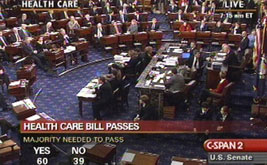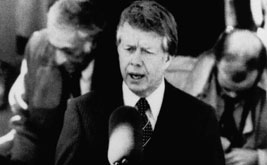So, SEIU Me
New York City
Three years ago, very few people anticipated the complete and worldwide collapse of the economy. Our nation lost $17 trillion, a quarter of its wealth, virtually overnight. Every industrialized nation is now faced with impossible choices and deep cuts that slice right to the heart of the hard-won gains, both tangible and social, that progressives and trade unionists have fought for.
Max Fraser, in his provocative article "The SEIU Andy Stern Leaves Behind" [July 5], asks many of the right questions but ultimately misses a key point: over the past fifteen years, SEIU accomplished something extraordinary. At a time when the American labor movement was shrinking, SEIU united more than 1.2 million workers in the union, doubling its size and the ability of those workers to make real and, one hopes, lasting gains on the job.
Fraser's critique really speaks to the heart of what all working people face as a threat: the collapse of the social welfare system and the failure of capitalism to protect the fundamental security of those who work for a living. And that's why SEIU's executive board spent three days recently addressing the crisis that workers face right now and planning forward.
We know that we cannot go it alone, because for all our union's progress in organizing and in politics, today we see the economic crisis destroying not only our jobs and our communities but also the standards we have worked so hard to achieve. Our decisions:
§ SEIU will continue working with partners in the labor, progressive and religious communities to march with workers through the streets to the doorsteps of very big banks that have been bad actors and have brought about this economic collapse.
§ SEIU will challenge the CEOs, politicians and even Democratic lobbyists who are helping those deemed "too big to fail" to continue to fail us.
§ SEIU will keep standing, marching and getting arrested with our coalition partners seeking justice for immigrants while at the same time we end the shadow economy that allows unscrupulous business owners to profit at the expense of all workers.
§ SEIU will participate in the global efforts to hold multinational corporations like Sodexo accountable for how they treat the women and men who work for them.
§ And SEIU will continue to fight day and night to see that workers—both in unions and not—are not forced to bear the burden of recovery alone.
There is no question that working people would be in much better shape if more workers were in unions, and we will continue our efforts to make sure that all workers who want a voice on the job are able to unite. The easy part is recognizing the obvious: none of us have solved the problem that working people face each and every day. The challenge for us all is not just to imagine but also to realize a future that restores our economy and rewards work.
GERRY HUDSON, executive vice president
Service Employees International Union
Fraser Replies
New York City
I thank Gerry Hudson for his thoughtful letter and agree with much of what he says about the challenges facing SEIU, the labor movement and working people in today's economy. He is right to note the important work SEIU has done over the past fifteen years to expand its membership while empowering workers in and out of unions. SEIU's accomplishments in both cases have been considerable, and the goals Hudson lays out for the years ahead are ambitious and inspiring.
But my article does not question this aspect of SEIU's recent history; nor does it imply that SEIU has not embraced a progressive political agenda that has put it at the forefront of today's struggles for civil rights, comprehensive immigration reform, financial regulation and the like. Rather, it should be read as a warning: if SEIU—and really, the rest of organized labor—hopes to continue to play a role in these and other popular movements, it absolutely must figure out a way to resolve the existential threat posed by declining density in the private-sector economy. If labor's industrial and economic strength continues to diminish in relation to corporate power, so too will whatever remains of the movement's political capital, as we already saw in the legislative battles over the doomed Employee Free Choice Act and, to a lesser extent, the healthcare overhaul.
As I argue in my article, SEIU came no closer to resolving this basic challenge under Andy Stern's leadership, despite the 1.2 million new members that Hudson cites. And in some cases, the more misguided and counterproductive strategies Stern embraced during his tenure set the union in the wrong direction. If Gerry Hudson and the SEIU executive board are committed to making sure that "all workers who want a voice on the job are able to unite" in a reinvigorated and progressive labor movement, this transitional moment at SEIU must be one of deep and serious self-criticism, reassessment and bold new thinking.
MAX FRASER
Public Workers—the Gold Standard
Amherst, Mass.
I thank Amy Traub for "War on Public Workers" [July 5]. Isn't it remarkable that privatization, deregulation and casino capitalism destroy our economy... and public employees are suddenly to blame? This attack on public employees, their unions and their benefits feels like the final swish down the toilet bowl for the New Deal. Some observations:
(1) Traub notes with disappointment that New York's Democratic gubernatorial candidate Andrew Cuomo has jumped on the bash-public-employees bandwagon; but he's not the only Democrat to do so. Massachusetts Governor Deval Patrick has honed the fine art of being seen as a progressive while leading the charge against public workers—reopening contracts and demanding concessions from all state employees, from social workers to librarians to college professors—but not asking for any "shared sacrifice" from the wealthy, and then bragging about it.
(2) Far from being a parasitic drain, public-sector workers provide critical services for everyone—education, public safety, environmental protection—that private enterprise cannot or will not supply.
(3) The public sector sets the standard for quality of employment, and that benchmark serves as a constant reminder of the failure of private corporations to provide adequate compensation and economic security for their workers.
Nowhere is the public benchmark clearer than in the case of pensions, and nowhere has the war been more ferocious. Resentment of public-sector pensions masks the important issue of adequate pensions for all working Americans. There is a pension crisis, but it's not the overgenerosity of public-sector pensions. The crisis is that the private pension system is collapsing. Companies that still offer traditional defined-benefit pensions—intended to provide a predictable retirement income for life—have underfunded their accounts. Most companies have ceased to offer pensions altogether or provide meager subsidies to roll the dice in the 401(k) casino. The consequences will be ugly. Many "retirees" will never retire. Or they will have to move in with their children, creating deep stresses, which had been eased by the solid pensions of the Greatest Generation.
Reducing public-sector pensions won't solve that problem. Public- and private-sector workers need to look at each other, recognize friends and demand leveling up, not down. The real problem is not public workers' pensions but private employers reducing their commitment to their workers while increasing executive salaries and stockholder dividends.
MICHAEL ASH
University of Massachusetts
Vale, S.D.
I am reminded of John D. Rockefeller's response to striking coal miners at Ludlow, Colorado, in 1913. He got the Colorado National Guard to shoot up the tent village of striking miners. This is an example of the private sector calling on the public sector to help the private sector exploit its workers.
ALVIN WILLIAM HOLST Read More
Our Readers and Max Fraser
















